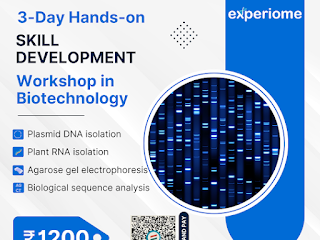Experiome Inc-Biotech Research Centre in Lucknow | Biotech Training in Lucknow

Experiome Organized a Guest Lecture Experiome organized a Guest Lecture on August 27, 2022, entitled, Fundamentals of Recombinant DNA Technology. The lecture was delivered by Dr Chandra P Chaturvedi, Associate Professor, Department of Hematology, SGPGIMS, Lucknow. Team Experiome would like to sincerely thank Dr Chaturvedi for sharing his experiences and insights about the tools, techniques and applications of recombinant DNA technology Biotechnology Projects for Undergraduate and Postgraduate Students in Lucknow | Training Programs in Bioinformatics in Lucknow | Biotech Research Centre in Lucknow | Biotech Training in Lucknow


